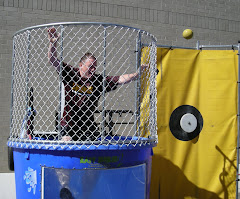This coming week, a team of teachers from Wilde lake Middle School and I will be traveling to Arundel High School to participate in one of the eleven Educator Effectiveness Academies being held this summer in the state of Maryland. All public schools in Maryland were required to identify a team of teachers this past spring who would attend this grassroots professional development program to begin the transition to the Common Core. This will be the state's official kick-off to the next wave of school reform that has been championed by President Obama and Education Secretary Duncan and developed by the Council of Chief State School Officers and the National Governor's Association. The academies are designed to help educators begin to understand the new Common Core State Standards, which are the foundation for the new Maryland Common Core State Curriculum.
 The Common Core State Standards for Mathematics, STEM, and English Language Arts (ELA); Literacy in History/Social Studies, Science, and Technical Subjects (“the Standards”) are the culmination of an extended, broad-based effort to fulfill the charge issued by the states to create the next generation of K–12 standards in order to help ensure that all students are college and career ready in literacy no later than the end of high school. They are designed to provide a consistent, clear understanding of what students are expected to learn, so teachers and parents know what they need to do to help them. The standards are meant to be robust and relevant to the real world, reflecting the knowledge and skills that our young people need for success in college and careers.
The Common Core State Standards for Mathematics, STEM, and English Language Arts (ELA); Literacy in History/Social Studies, Science, and Technical Subjects (“the Standards”) are the culmination of an extended, broad-based effort to fulfill the charge issued by the states to create the next generation of K–12 standards in order to help ensure that all students are college and career ready in literacy no later than the end of high school. They are designed to provide a consistent, clear understanding of what students are expected to learn, so teachers and parents know what they need to do to help them. The standards are meant to be robust and relevant to the real world, reflecting the knowledge and skills that our young people need for success in college and careers. The Standards set requirements not only for English language arts (ELA) and Mathematics, but also for literacy in history/social studies, science, and technical subjects. Just as students must learn to read, write, speak, listen, problem solve and use language effectively in a variety of content areas, so too must the Standards specify the literacy skills and understandings required for college and career readiness in multiple disciplines. Literacy standards for grade 6 and above are predicated on teachers of ELA, history/social studies, science, and technical subjects using their content area expertise to help students meet the particular challenges of reading, writing, speaking, listening, and language in their respective fields. It is important to note that the 6–12 literacy standards in history/social studies, science, and technical subjects are not meant to replace content standards in those areas but rather to supplement them.
The newly adopted standards also lay out a vision of what it means to be a literate person in the twenty-first century. Indeed, the skills and understandings students are expected to demonstrate have wide applicability outside the classroom or workplace. Students who meet the Standards readily undertake the close, attentive reading that is at the heart of understanding and enjoying complex works of literature. They are able to problem-solve using a variety of methods and demontrate critical thinking skills. They habitually perform the critical reading necessary to pick carefully through the staggering amount of information available today in print and digitally. They actively seek the wide, deep, and thoughtful engagement with high-quality literary and informational texts that builds knowledge, enlarges experience, and broadens worldviews. They reflexively demonstrate the cogent reasoning and use of evidence that is essential to both private deliberation and responsible citizenship in a democratic republic. In short, students who meet the Standards develop the skills in reading, writing, speaking, and listening that are the foundation for any creative and purposeful expression in language. (Source: modified from http://www.corestandards.org/)
I am looking forward to attending the Educator Effectiveness Academy and learning more about the common core. In particular, I am interested in developing a greater knowledge of the Common Core State Standards and the Curriculum Frameworks for Mathematics and English Language Arts, understanding the relationship between Maryland’s vision of STEM and the Curriculum Frameworks, and beginning to create our school's transition plan that will guide our staff in preparing to implement the changes that will be necessary.
It is exciting work!
Stay tuned...I plan to share more when I learn more.




















No comments:
Post a Comment